Avoiding regulation of biometric surveillance and loyalty applications: The 20th Big Brother Awards took place in the Czech Republic
For the twentieth time, the Czech organization and EDRi member IuRe (Iuridicum Remedium) awarded prizes to the greatest snoopers.
Filter resources
-

Avoiding regulation of biometric surveillance and loyalty applications: The 20th Big Brother Awards took place in the Czech Republic
For the twentieth time, the Czech organization and EDRi member IuRe (Iuridicum Remedium) awarded prizes to the greatest snoopers.
Read more
-

Pre-travel controls: Digitalising travel documents
We are responding to a public consultation on the European Commissions’ digitalising travel documents proposal. This proposal promises convenience in travel but could pave the way for biometric mass surveillance and automated discrimination.
Read more
-

Deported for reporting a crime: the paradox of securitisation policies
The review of the Return Directive, which governs detention and deportation procedures in the EU, should not lead to the criminalisation of undocumented people. Rather, it should uphold their fundamental right to personal data protection by establishing firewalls that allow them to report crimes without fears of being deported.
Read more
-

Rushed EU eID Wallet risks privacy and security: Calls for safeguards are getting ignored in hasty eIDAS implementation
From a visit to the doctor to public transport tickets , the European eID will handle our most sensitive personal data in a wide range of every-day applications. Yet, speed seems more important to the European Commission than a properly functioning eID system that is safe & secure to use.
Read more
-
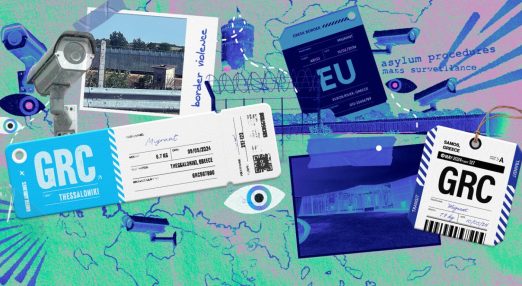
Surveilling Europe’s edges: when digitalisation means dehumanisation
In May 2024, Access Now’s Caterina Rodelli travelled across Greece to meet with local civil society organisations supporting migrant people and monitoring human rights violations, and to see first-hand how and where surveillance technologies are deployed at Europe’s borders. In the first of a three-part blog series reflecting on what she saw, Caterina explains how, all too often, digitalising borders dehumanises the people trying to cross them.
Read more
-
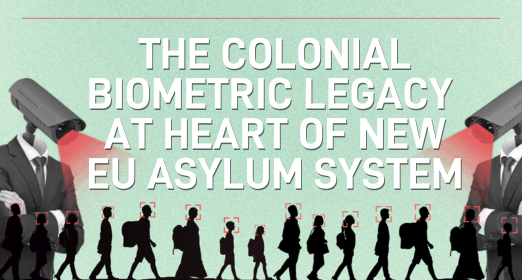
The colonial biometric legacy at heart of new EU asylum system
On Wednesday (10 April), the EU is set to vote on a new set of asylum and migration reforms. Among the many controversial changes proposed in the new migration pact, one went almost unnoticed — a seemingly innocent reform of the EU's asylum database, EURODAC. Although framed as purely technical adjustments, the reality is far more malicious. The changes to EURODAC will massively exacerbate violence against people on the move.
Read more
-
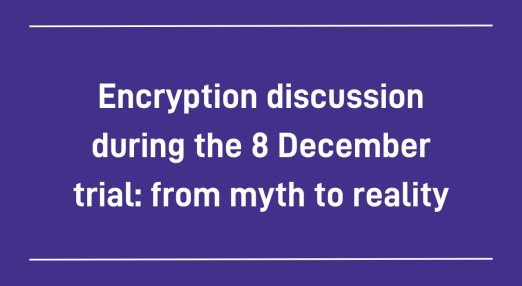
Encryption discussion during the 8 December trial: from myth to reality
The defendents’ fundamental right to privacy was treated flippantly and shown little interest by the judges and prosecution of the Paris criminal court in the ‘8 December’ trial hearings. This is a cause for concern and could lead to the justification of police’s ever-increasing surveillance.
Read more
-

Political negotiations continue: EU lawmakers fail to agree on strong rules for regulating political advertising
On 10 October, the European Parliament, the Commission and the EU Council had their fifth meeting (in the so-called trilogues) to find an agreement on the transparency and targeting of political advertising. The three institutions could not come to a consensus. Here is why.
Read more
-
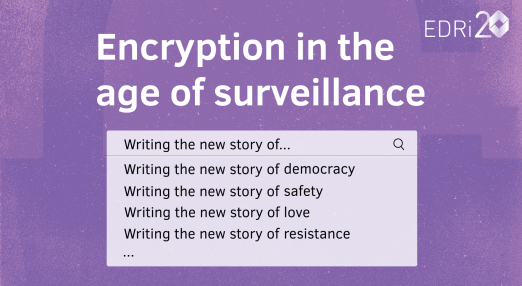
Event summary: Encryption in the age of surveillance
The EDRi-organised event on encryption, surveillance, and privacy brought together key policymakers, academics, activists and members of the press to build a better understanding of why encryption is important for people and democracy.
Read more
-
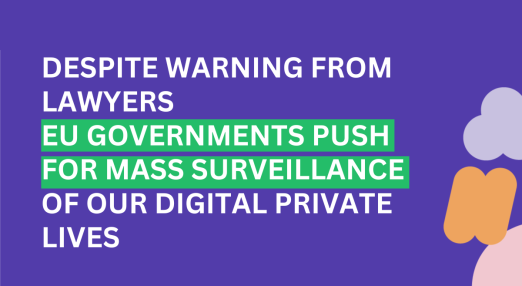
Despite warning from lawyers, EU governments push for mass surveillance of our digital private lives
Whilst several EU governments are increasingly alert to why encryption is so important, the Council is split between those that are committed to upholding privacy and digital security in Europe, and those that aren’t. The latest draft Council text does not go anywhere near far enough to make scanning obligations targeted, despite clear warnings from their own lawyers.
Read more
-

Civil liberties MEPs warn against undermining or circumventing encryption in CSAR
MEPs from the European Parliament’s Civil Liberties committee have thrown down the gauntlet with their amendments to one of the EU’s most controversial proposals: the Child Sexual Abuse Regulation (CSAR). These amendments show a clear majority for fully protecting the integrity of encryption. Content warning: contains discussions of child sexual abuse and child sexual abuse material
Read more
-

As AI Act vote nears, the EU needs to draw a red line on racist surveillance
The EU Artificial Intelligence Act, commonly known as the AI Act, is the first of its kind. Not only will it be a landmark as the first binding legislation on AI in the world – it is also one of the first tech-focused laws to meaningfully address how technologies perpetuate structural racism.
Read more
